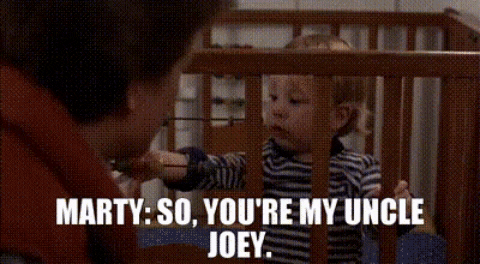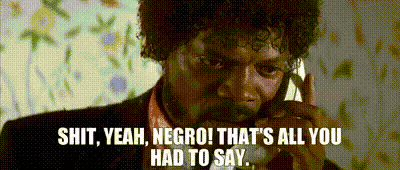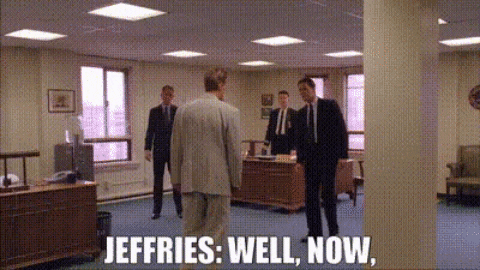At the prom. Everyone is standing, watching the stage. Xander is miming anticipation.
Announcer:
And the award for Sunnydale High's Class Clown for 1999 goes to — Jack Mayhew.
The winner puts on a balloon hat and acts silly.
Xander:
Please! Anybody can be a prop class clown.
You know, none of the people who vote for these things are even funny.
Buffy is at the punch bowl, ignoring the ruckus.
The announcer urges Jonathan to the microphone.
Jonathan:
We have one more award to give out.
Is Buffy Summers here tonight?
Did she, um...
The crowd turns and finds her.
She looks nervous at the attention.
Jonathan:
This is actually a new category.
First time ever.
I guess there were a lot of write-in ballots, and, um,
the prom committee asked me to read this.
"We're not good friends.
Most of us never found the time to get to know you,
but that doesn't mean we haven't noticed you.
We don't talk about it much, but it's no secret that Sunnydale High isn't really like other high schools.
A lot of weird stuff happens here."
The Chorus :
Zombies!
Hyena-People!
Snyder! (laughter)
"But, whenever there was a problem or something creepy happened,
you seemed to show up and stop it.
Most of the people here have been Saved by you,
or helped by you at one time or another.
We're proud to say that the Class of '99 has the lowest mortality rate of any graduating class in Sunnydale history.
(applause from the crowd)
And we know at least part of that is because of you.
So the senior class, offers its thanks, and gives you, uh, this —
Jonathan produces a multicolored, glittering, miniature umbrella with a small metal plaque attached to the shaft.
It's from all of us, and it has written here : -
' Buffy Summers —
Class Protector '
The crowd breaks into sustained applause and cheering.
Buffy walks to the stage and takes her award.
Cut to Buffy, watching the dancers.
Giles comes up behind her.
Giles:
You did Good Work tonight, Buffy.
Buffy:
And I got a little toy surprise.
Giles:
I had no idea that children en masse could be gracious.
Buffy:
Every now and then, people surprise you.
Giles: (looking past her)
Every now and then.
“Iain Spence published Sekhmet Hypothesis: The Signals of the Beginning of a New Identity as a book in 1995, but it wasn’t until two years later that I came across his ideas in an article he’d written for the magazine Towards 2012. As an illuminating way of reconsidering the familiar, I’m particularly fond of the Sekhmet Hypothesis, which never fails to get people talking at parties. As usual, please remember that this is just a framework; a way of ordering information into meaningful patterns in the service of creative lateral thinking, if you like. You may be able to find all kinds of examples to refute this data, but first bear in mind that I’ve used this predictive model to great effect and no small financial reward, and trust me when I say I’m passing it on as a tip, not as a belief system. If this book has made any point clear, I hope it’s that things don’t have to be real to be true. Or vice versa.
Soon you’ll notice how many advertisers and trend makers are aware of this theory and have been applying it to product placement, design, and the seasonal shifts of the rag trade since Spence published it. The more people know about it and react against it, or try to preempt it, the more the effect is likely to dissipate or find different ways to express itself. That may already be happening in the windblown halls of popular culture, although as I write, in 2010, Spence’s broad predictions are accurate still.
Sunspot activity follows a twenty-two-year cyclical pattern, building to a period of furious activity known as the solar maximum, then calming down for the solar minimum. Every eleven years, the solar magnetic field also undergoes a polarity reversal. It’s a little like a huge switch that toggles on or off, or the volume slider on a mixing desk, with loud at one end and silent at the other, and each period is given an identifying number. Cycle 23, for instance, had its maximum in 1999.
Spence suggests that these regular rewirings of the solar magnetic field naturally have an effect on the human nervous system, which leaves its traces most clearly in our cultural record—like a desert wind carving the shape of its passage into the dunes of fashion, art, and music. As a shorthand toward understanding the two maximum states we flip between, Spence suggests we can regard one pole as having a “punk” character, while its opposite may be thought of as “hippie.”
In Spence’s lexicon, at least as I understand it (his own website will set you straight if. wrong), punk maxima can be identified in a fashion vogue for short hair, tight clothes, short, punchy popular music, aggression, speedy drugs, and materialism. Hippie, as I’m sure you’ll have guessed, is associated with signifiers from the converse end of the spectrum, like long hair, loose or baggy clothes, longer-form popular music, psychedelic or mind-expanding drugs, peace, and a renewed interest in the spiritual or transcendental. He focused on youth culture trends on the basis that young nervous systems registered the magnetic reversals most profoundly and reflected them back in the lineaments of the art and music they made or consumed. So far, so good.
In 1955, when our planet was bombarded by cycle 19 solar magnetic waves, young people in the West responded like needles in a groove with rock ’n’ roll’s tight jeans, short hair, biker JD aggression, short, fast songs, and widespread use of stimulant drugs like speed and coffee.
Silver Age comic-book punk was embodied by crew-cut Barry Allen in his speed suit. “Chemicals and Lighting” could have been a song or a band.
The tight suits, establishment men, and emphasis on science and rationality are all “wrong), punk maxima can be identified in a fashion vogue for short hair, tight clothes, short, punchy popular music, aggression, speedy drugs, and materialism. Hippie, as I’m sure you’ll have guessed, is associated with signifiers from the converse end of the spectrum, like long hair, loose or baggy clothes, longer-form popular music, psychedelic or mind-expanding drugs, peace, and a renewed interest in the spiritual or transcendental. He focused on youth culture trends on the basis that young nervous systems registered the magnetic reversals most profoundly and reflected them back in the lineaments of the art and music they made or consumed. So far, so good.
In 1955, when our planet was bombarded by cycle 19 solar magnetic waves, young people in the West responded like needles in a groove with rock ’n’ roll’s tight jeans, short hair, biker JD aggression, short, fast songs, and widespread use of stimulant drugs like speed and coffee.
Silver Age comic-book punk was embodied by crew-cut Barry Allen in his speed suit. “Chemicals and Lighting” could have been a song or a band. The tight suits, establishment men, and emphasis on science and rationality are all typical, as are Stan Lee’s realistic superheroes such as the Fantastic Four and Spider-Man.
Eleven years later, cycle 20 reversed the polarity. By 1966, hair had become longer, clothes were looser and more flamboyant, music became more involved and sophisticated, and the drugs were mind expanders like LSD.
In 1966 the cosmic wave entered the comics, to bring with it the gods of Thor, villains like the Anti-Matter Man, and John Broome’s psychedelic Flash stories. The new heroes were antiestablishment “freaks” and mutants.
Nineteen seventy-seven brought a shift back to punk, as expressed in Malcolm McLaren and Vivienne Westwood’s fifties-influenced clothes and music, bondage and restriction, amphetamine sulfate use, and angry, confrontational politics.
The comics boom of that cycle gave us Judge Dredd, Frank Miller’s gritty noir, Alan Moore’s harsh logical realism.
Nineteen eighty-eight saw ecstasy, or MDMA, as the favored drug, accompanying long-form trance, ambient and dance music, Manchester “baggy” fitness wear as street wear, grunge beards, and a return to long hair. In comic books, this was the time of Deadline, Doom Patrol, Shade, and Sandman.
Spence didn’t get as far as 1999 in his Towards 2012 essay, but he imagined the rise of a “Stormer” generation of what he called “imperial youth.” As it happened, his predictions were more or less accurate. In 1999, we had nu-metal, The Matrix, tight clothes, short hair, No Logo anticorporate demos, the emergence of bondage styles, and the Goth underground moving into the mainstream, a revival of popularity for cocaine, and, more significantly, perhaps, the jittery rise of Red Bull, Starbucks and coffee society. Comics gave us proactive world-changing superheroes and villains in Authority, Marvel Boy, and Wanted.
This book will be published in 2011, when the fruits of the next wave will be hard to avoid. As I write, the word psychedelic is being used so often on TV and in magazines that it’s barely funny. Avatar’s hippy eco-vision of an interconnected natural world and the massive success of Alice in Wonderland (always popular during hippie periods) exemplify this current, as do the vampire heroes who have occupied the imaginative place once taken by sixties Pre-Raphaelite and Edwardian dandies. In comics, the “realism” boom has been quietly left behind like an unfashionable pair of trousers. The new superhero books are becoming more fantastic, colorful, and self-consciously “mythic.”
Spence’s article does not, nor will I, attempt to track the alleged effects of these undeniably real solar magnetic events on non-Western cultures.
Neither does he extend his argument backward to consider the ways in which the popular arts scene of 1944 could be described in “hippie” terms (LSD, however, was synthesized in 1945), or that of 1933 as “punk” (although perhaps Weimar decadence and the art of George Grosz could build a case there). And so on. I leave that contemplation to skeptics who choose to debunk the idea or to zealots who want to believe it.
Unless Terence McKenna’s “Timewave Zero” theories are correct, and we collapse into an atemporal singularity on December 21, 2012, 2021 will bring the cycle back around to “punk,” and if this seesaw sounds horribly predictable and repetitive, be assured that it will all seem fresh to the young people who take their own inspiration from the solar trade winds.
As for me, I intended to bring my run on JLA to an end along with the century. The Invisibles, too, was scheduled to wrap in 2000, and I planned to re-create myself again to complement the change in the weather. I was almost forty, had never felt better, and wanted to be ready for the harsher spirit I’d decided was on its way in the wake of the Labour election win, the death of the former Princess Diana, and the commencement of cycle 23.
I’d also just met my future wife, Kristan, a stunning, brainy blonde who dressed like Barbarella to go to the pub, worked as a corporate insurance broker, and read Philip K. Dick. It would be another three years before our paths crossed again and we were able to get together, but that die was already cast.
On a trip to Venice, Italy, I bought my first real suit—Donna Karan—and was encouraged to go corporate. Smart tailoring and the jargon of advertising, motivational speaking, instead of fractal-patterned shirts and druggy psychedelia, seemed the way to go in cycle 23. At heart, I’d always been an uptight Presbyterian anyway. I’d never been “able to get back to the radiant world I’d reached in Kathmandu, and I’d begun to “suspect it was because in some way I was already there. I had very little doubt that I’d “wake up” in that place at the moment of death, like a game player looking up from the screen where his avatar lies bleeding, only to realize he’s home and safe and always was.
“The drugs don’t work, they just make you worse,” sang the Verve, and after eight years of experimentation, ruthless self-examination, ego inflation, and ego loss, I had to admit they were probably onto something. The shallow hedonistic spirit of the nineties was too fragile to endure the cold of the vast twin shadows cast backward by an onrushing age of terror. Darker times were on their way, demanding a new clarity and rigor of thought.
I tried to articulate the outlines of the next trend by introducing to the pages of JLA a military-funded superteam called the Ultramarines, whipped up by Uncle Sam to keep the Justice League in check should their internationalist stance ever compromise US military security. By the end of the story, the Ultramarines had split from their paymasters and joined with a group of like-minded DC heroes in a hovering city-sized headquarters named Superbia, there to announce a bold new manifesto for change :
SUPERBIA HEREBY DECLARES INDEPENDENCE FROM ALL NATIONS AND OPENS ITS GATES TO SUPER-CHAMPIONS FROM THE FOUR CORNERS OF THE EARTH. WE INTEND TO SERVE AS A FIRST-STRIKE GLOBAL PEACEKEEPING FORCE. WE WILL KILL IF WE HAVE TO. IF WE HAVE TO, WE’LL LET YOU KNOW. TERRORISTS, DESPOTS, CORRUPT BUSINESSMEN … THE INTERNATIONAL ULTRAMARINE CORPS IS HERE. THERE’S NOWHERE TO HIDE.
As it happened, I’d almost exactly described what the next big development of the superhero concept would look like.
Meanwhile, I prepared myself for the oncoming zeitgeist by listening to Chris Morris’s bleak, brilliant, bad-trippy Blue Jam on Radio 1 every Thursday after John Peel. Oddly enough, I was beginning to find humor in all the things that had once frightened me. The prying eye of Big Brother, the aging process, loneliness, failure, and death were all just punch lines to the joke. I loved to listen over and over again to HAL 9000’s death scene from the soundtrack to 2001 : A Space Odyssey, and when Jarvis Cocker and Pulp released their masterpiece comedown album, This Is Hardcore, its unflinching evocation of middle age, stale waterbeds, and tinny bachelor pad music made me rethink my own lifestyle.
I was about as alien as I’d ever wanted to be, but I’d grown tired of one-night stands, drink, drugs, and the dating game.
It was time to get serious.”



